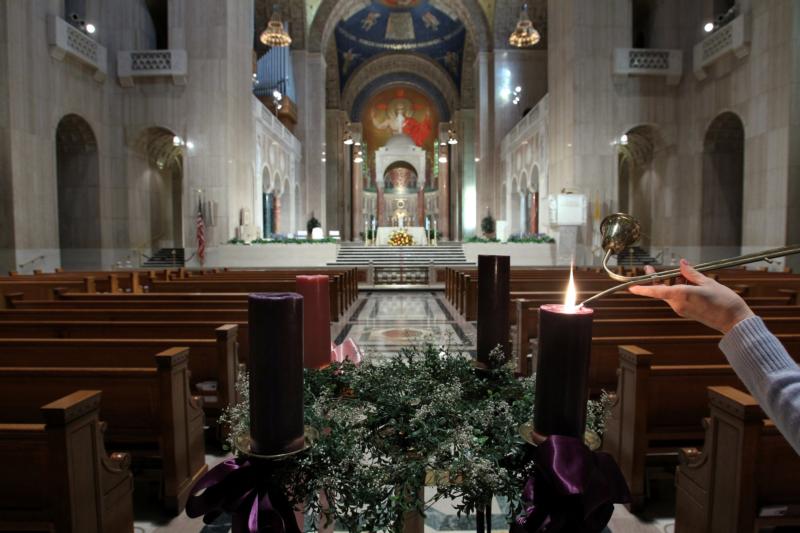
This photo illustration shows a candle being lit on an Advent wreath at the Basilica of the National Shrine of the Immaculate Conception in Washington. While the days grow darker, the Advent wreath grows brighter with light from an additional candle each week. (CNS photo illustration/Bob Roller)
I dread the shorter, colder days that coincide with Advent here in the Northeast. It’s hard to enjoy a sunset at 4:30 in the afternoon. Fortunately, while the days grow darker, our parish Advent wreath grows brighter with light from an additional candle each week. God’s light has a way of shining brighter when life seems darkest.
The Advent readings also brighten my outlook — especially the prophet Isaiah’s encouraging words: “Comfort, give comfort to my people” (Is 40:1). God asked the prophet to reassure the suffering Israelite exiles in Babylon.
Although God allowed his people to experience the consequences of their wrongdoing, he didn’t abandon them. He promised to be with the exiles, to nurture them, hold them close and lead them home.
[hotblock]
Some years ago, like those Israelites, I felt exiled from all that was familiar to me, including my family and friends. I’d always prided myself on being hardworking, self-sufficient and helpful to others — or so I thought.
After a car accident, followed by a diagnosis of multiple sclerosis, that all changed. I could no longer live up to my own self-image. Who was I if I couldn’t work hard? Who’d want me around if I couldn’t do things for them?
I found out the hard way that many of the things I thought I did “for others” had been attempts to control, pump up my own ego and earn approval or affection. When my false supports crumbled, I felt useless, miserable and terrified.
Isaiah urged the Israelites to prepare for the Lord by making a straight way in the desert. In my darkest hour, God came into the desert of my heart. Although he allowed me to experience my particular challenges, he didn’t abandon me.
When I was ready to be honest and face my false pride, God tenderly led me through my emotional wasteland. He showed me that my abilities are gifts, not to be denied but not to be relied on in place of him. In acknowledging my limitations I’m honoring God instead of my own capabilities.
Isaiah promised that “every valley shall be filled in, every mountain and hill shall be made low” (Is 40:4). He didn’t say we have to fill in our own valleys or knock down our own mountains.
I’d tried to fill my low self-esteem by struggling to be Wonder Woman. Then I’d knock down my pride by telling myself I wasn’t so great. Neither worked.
Through my challenges, God taught me that I don’t have to prove anything to be worthy of love. In fact, I’m better able to give and receive love when I’m not trying too hard. My relationships with family and friends are much more relaxed and genuine now.
We all have value simply because God loves us so much that he wants to be with us. Although Isaiah said to prepare by making a straight way for the Lord, Jesus said he is the way (Jn 14:6).
So how do we make a straight way for our Savior? By getting straight with ourselves, by honestly admitting our shortcomings and recognizing how much we need him. It’s safe to face this truth because we have the reassurance of God’s love for us just as we are.
We celebrate our Savior’s coming to be with us that first Christmas. We also have his promise that he will come again and take us to be with him. God kept the first promise so we can trust him to keep the second.
Meanwhile, as we prepare our hearts for Christ’s coming this Advent season, let’s remember that God is eternal. Eternity doesn’t mean an endless extension of time, it means being beyond time.
We can trust the light of God’s love to burn within us whenever life is at its darkest — whether the darkness is outside of us or within our hearts — because eternity includes right now.
***
Hosbach is a freelance writer and author of “‘Your Faith Has Made You Well’: Jesus Heals in the New Testament.”
PREVIOUS: Hope in motion, preview of another rising: Poems for Advent
NEXT: The best ‘diva,’ Mary never stormed off stage but kept spotlight on God


Share this story